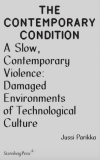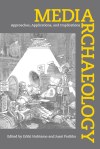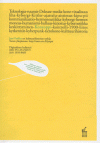Critique With a Cause – on Lovink’s new book
Geert Lovink can be provocative – very provocative. This is one of the pleasures of diving into his writings and books, just like with Networks Without a Cause, the most recent one published by Polity.
Lovink is a good “network barometer”, a measuring device in his own right, who captures significant themes being debated, even if not always within academia. And I say that as a good thing.
Lovink’s style of defending the work of concepts and theory but steering clear of stuffy academic language and managerial games, of investigating global trajectories without buying into neoliberal globalization speak, and investing so much into perspectives that stay close to code and technology without reducing his work into techy-geekyness is always a good combo.
Networks Without a Cause works it’s way through the current crisis of social media and the public sector, including universities, and provides insights into the managerial cultures that combines both. Of course, these are two different kinds of crisis; Social Media companies are perhaps not in the financial crisis as the public sector, but in a state where their stance towards security, surveillance and privacy is being increasingly questions; and well, public sector both being pressed by the cuts and austerity programs as well as the managerial attitude creeping into a range of institutions. Hailing the liberatory effects of Social Media is just, well, naïve in the age when no user is probably unaware of the surveillance and business logics of such proprietary platforms. Similarly, Lovink picks up on the crisis of theory in universities, or more specifically a take on media studies’ role in current educational landscape.
For a media studies scholar, the chapter (see also a piece co-written with Ned Rossiter) is a tough read – but thoroughly enjoyable! I found a weird sense of satisfaction reading it, despite disagreeing on points; something about the provocation was to me spot on, in terms of placing media studies as part of the managerial drive in current universities – and UK is an especially apt case. While noting the running down of Arts and Humanities worldwide, Lovink picks up on media studies as “an academic genre [that] sprang out of the heads of education consultants and bureaucrats and blended into unrelated departments and intellectual cultures, in order to scale-up output.” (83) In other words, while registering the birth of media studies as a jumbled together mixed bag of variety of disciplines from film to theatre, cultural studies to new media studies, Lovink continues the argument as one related to theory. On the one hand, a “neutering” of innovative theory that has become a mechanical mode of application (“watching Heroes with Zizek in our favorite interpassive mode, flowing through the national libraries with Castells, understanding Google a la Deleuze, or interpreting Twitter via Butler?”); on the other hand, academic theory becoming only a means towards the end of managerially controlled research output exercises.
Yet, one could object – and should. As Michael Goddard noted on Facebook, where does this place then such fields as Media Ecology (after Matt Fuller) or Media Archaeology, which I also would claim is not only a look backwards to the old media studies groundings in television, radio or visual culture? Furthermore, whereas institutional settings in our discplines such as media are becoming threatened by admin culture, media studies scholars are happy to carry the legacy foward and come up with extra-institutional and other innovative settings for theory work and critique — read for instance Mirko Tobias Schäfer’s recent thoughts on tactics of going rogue. Another objection might be raised when Lovink quotes Lev Manovich, and Manovich’s critique of 1960s-1980s theory that has lost its relevance “because commercial culture and computers today run on many principles of this theory – from irony and the self-referentiality of advertising to ‘rhizomatic’ networks. So to use many of these theoretical concepts is to state the obvious.”
Manovich has a nice point here of the recursive nature with which earlier critical theory has turned part of the advertising folks toolkit. To a large extent, that can be seen true, but also we need to be aware that a very uninspiring and loose use of for instance notions like “rhizome” in 1990s cyberculture studies does not equate into it being completely part and parcel with the network condition. That a lot of Anglo-American adaptation of French philosophy for instance produced a range of misreadings and reliance in such notions of distributed nature, rhizomes, irony etc. is not exactly the same as assuming that a misplaced metaphor suddenly determined the state of new media. Such a stance would just validate bad theory. We need to be able to really read theory – and understand where theory turns rotten, uninspiring, and badly applied; not just dismiss it altogether that easily and uncritically.
However, Lovink picks up on exciting ways to develop theory. It is not about being dismissive, but clearly wanting to see something new to happen. Although I would claim that a lot of this is happening – however, not much supported in the creative industries/digital economy academic culture of for instance Britain – and gradually carving out more visibility. I agree with Lovink that such openings as Fuller & Goffey’s Evil media is among them, similarly as McKenzie Wark’s notes that are as needed. Even Manovich’s quantitative cultural analytics can be seen as an interesting move away from a traditional hermeneutics approach, developing media specific methodologies.
Indeed, media studies – like pretty much all arts and humanities disciplines – is in a difficult spot in relation to funding cuts, decrease in public support (well, in the UK media studies has historically been in a bad spot as the blamed mickey mouse-field, hated by the Tories and media), increasing managerial culture surrounding research (REF) and teaching (counterintuitive QAA), as well as the temporal issues. As Lovink notes, in an increasingly quickly changing media cultures, the cycles of academic studies are just too slow to be up to date, and often their destiny is to focus on historical phenomena. Whereas some approaches, such as media archaeology, might be able to turn that to their advantage, that does not hide the problem entirely. More radical structural changes are needed in publishing and recognition systems. This means for instance on such levels as REF a sustained commitment to supporting open access journals and experimental formats of publishing academic research.
Lovink writes about writing (net criticism genre), radio, blogging, google, wikileaks and more – pretty much a range of the most debated events and platforms of past years. And still his book feels something that you actually enjoy reading. This might sound like a casual and banal observation, but I mean it in the sense of actually expecting to reach the end of the page, just to turn to next page. Lovink observes, inscribes and reports – but with a twist that makes his style so recognizable. His provocative style is attractive, and whether you agree or not on the points, well, he is making a point.
-
June 5, 2012 at 5:57 pmCritique With a Cause – on Lovink’s new book « Machinology | Pantheon
-
June 9, 2012 at 10:15 amJussi Parikka on Geert Lovink | Thinking culture
-
July 20, 2012 at 6:31 pmReviews and other material related to Networks Without a Cause :: net critique by Geert Lovink

















